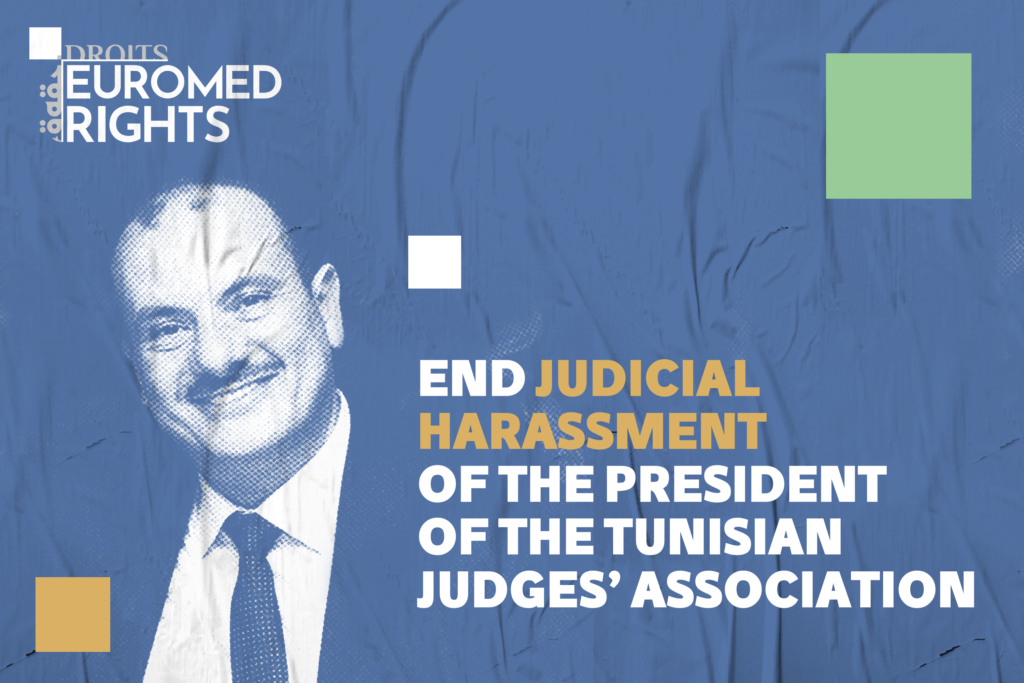On August 21, Judge Anas Hmedi, President of the Tunisian Judges’ Association (Association des Magistrats Tunisiens, AMT), is set to appear before an investigating judge at the Kef Court of First Instance, facing charges of “inciting to cease work” arising from a judicial strike in 2022, seven human rights groups said today.
The undersigned human rights organizations call on the Tunisian authorities to drop the charges against Anas Hmedi and end all forms of harassment against judges exercising their rights to peaceful freedom of expression, assembly, and association.
This politicized prosecution and relentless targeting of the President of the Tunisian Judges’ Association are acts of retaliation against the association’s vocal stance against the assault on judicial independence and the executive’s systematic interference with the judiciary, which has been ongoing since the President’s power grab on 25 July 2021, the groups said.
Since July 2021, Hmedi, who serves at the Monastir Court of Appeal, has first been targeted along with other judges by what appears to be a defamation campaign, then subjected to arbitrary disciplinary proceedings and a criminal prosecution. The authorities started escalating their harassment against Hmedi after he co-organized a judges’ strike in June 2022 – in his capacity as president of the AMT – to protest the arbitrary dismissal of 57 magistrates (judges and prosecutors) by president Kais Saied. In particular, the General Inspectorate of the Justice ministry repeatedly summoned him for questioning in connection with his associative activities.
In July 2022, the prosecution’s office at the Monastir Court of First Instance requested that the Temporary High Judicial Council (THJC) lift Hmedi’s judicial immunity to enable his prosecution on criminal charges related to his purported “obstruction of work” and “incitement” of other judges of the Monastir Court to strike.
The request was made following a lawyer’s complaint related to events on June 13, 2022, when Hmedi peacefully stepped in during a hearing at the Monastir Court to ask a judge to suspend his work and join the strike, a request to which the judge responded positively, according to one of Hmedi’s lawyers, Faouzi Maalouli. The judges’ strike lasted four weeks during June-July 2022.
On September 20, 2022, the THJC lifted Hmedi’s judicial immunity. Subsequently, in October 2022, the deputy prosecutor at the Monastir Court of First Instance opened a criminal investigation against him under article 136 of the Tunisian Criminal Code for “inciting [a judge] by violence, assault, threats, or fraudulent practices to cease performing their individual or collective duties,” an offense punishable by three years’ imprisonment and a fine.
In August 2022, the THJC had opened a disciplinary procedure against Hmedi based on the same allegations. The THJC only summoned Hmedi in March 2023 for a disciplinary hearing initially scheduled for 16 May 2023 and subsequently rescheduled to 26 September 2023.
Hmedi is targeted for his legitimate and peaceful defence of judicial independence. This is a clear attempt to send an unequivocal message that challenging the executive’s control over the judiciary will not be tolerated, the groups said.
Hmedi’s conduct and the AMT’s work are protected under international human rights law, notably articles 19, 21 and 22 of the ICCPR on the rights to freedom of expression, peaceful assembly and association, respectively. The UN Basic Principles on Independence of the Judiciary state that, “Judges shall be free to form and join associations of judges or other organizations to represent their interests, to promote their professional training and to protect their judicial independence.”
Background
The UN Special Rapporteur on the Independence of Judges and Lawyers and the Special Rapporteur on the Rights to Freedom of Peaceful Assembly and Association have expressed concern over the targeting of Hmedi in a communication addressed to the Tunisian government on 22 August 2022.
The THJC lifted the judicial immunity of Anas Hmedi but, according to Hmedi, failed to formally inform him of the decision in writing, as required by law. Without an official written decision, Hmedi was unable to immediately challenge the lifting of his judicial immunity before the Administrative Court, in violation of his right to an effective remedy. It is only when he got access to a copy of the case file from the Monastir Court of First Instance in December 2022 that he obtained a copy of the THJC’s decision, which is needed for appeal.
In December 2022, Hmedi challenged the THJC’s decision to lift his immunity before the Administrative Court, requesting its immediate suspension. Under Tunisian law, requests for suspension of administrative decisions are dealt with pursuant to an urgent procedure and, in practice, they are adjudicated in few months, according to lawyers. However, Hmedi’s request is still pending.
In February 2023, the General Prosecutor of the Tunis Court of Appeal decided to move the case against Hmedi from the Monastir Court to the Kef Court of First Instance.
On June 1, 2022, President Saied issued Decree-Law 2022-35 giving himself the authority to summarily dismiss judges and prosecutors without due process. The same day, he dismissed 57 judges and prosecutors by decree, accusing them of corruption.
Tunisian law guarantees the right to strike. Article 36 of the 2014 Constitution, which was into force when the June-July 2022 strike took place, ensured the right to organize in unions to all except for individuals employed in the army, members of the security forces and customs officers. The 2022 Constitution, which came into force in August, deprived the magistrates of their right to strike.

